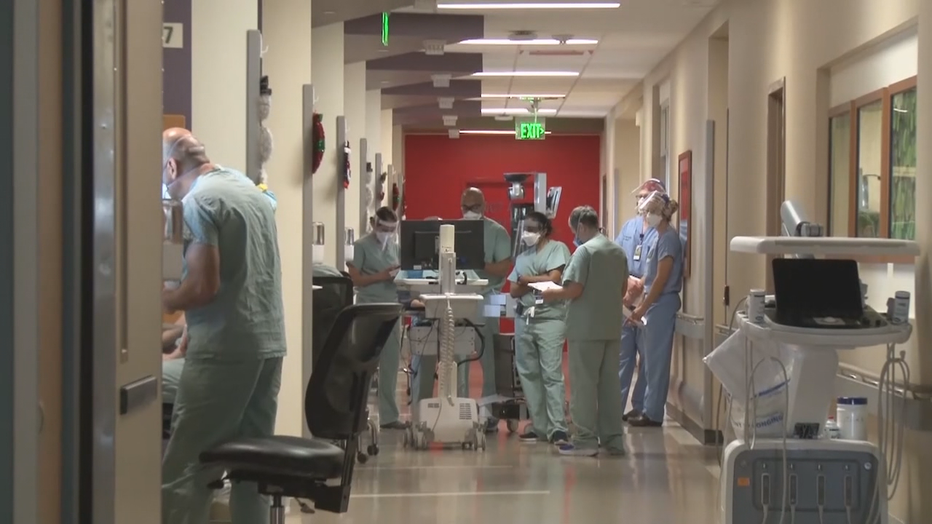More medical workers deployed to Texas hospitals as COVID-19 hospitalizations continue to rise
More medical workers deployed to Texas hospitals as COVID-19 hospitalizations continue to rise
Texas Governor Greg Abbott announced Thursday that an additional 2,500 medical staff will be deployed to hospitals. Still, medical experts warn that may still not be enough if the hospitalization rate doesn't start to improve.
DALLAS - A trusted forecasting model projects 100,000 more COVID-19 deaths in the U.S. between now and December 1.
But with some changes, that number could be cut drastically.
The University of Washington model shows that if nearly everyone wears a mask in public spaces, the death toll could be sliced in half.
RELATED: 100K more COVID-19 deaths in US by December, projection model predicts
Getting vaccinated, limiting social gatherings, and staying home when sick would help even more this fall.
These mitigation efforts would directly affect hospitals too, where healthcare workers are stretched thin and burning out.
Texas Governor Greg Abbott announced Thursday that an additional 2,500 medical staff will be deployed to hospitals.
That will bring the overall total to 8,100 statewide.
Still, medical experts warn that may still not be enough if the hospitalization rate doesn't start to improve.
COVID-19 hospitalizations for North Texas were slightly down between Wednesday and Thursday.
There are a total of 3,169 patients in 19-county North Texas trauma region.
That still accounts for more than 21% percent of all patients in North Texas hospitals.
"I think, over the next two, two-and-a-half, three weeks, we're going to see increases," Dallas-Fort Worth Hospital Council President Stephen Love said.
Love expects the number of COVID-19 hospitalizations to climb through at least Labor Day weekend.
Bed capacity in the region is extremely low.
Wednesday was a pandemic high for pediatric cases, with no staffed pediatric ICU beds available. For a second day in row, there were no staffed pediatric ICU beds in North Texas on Thursday.
RELATED: North Texas pediatric hospitals at 93% capacity; doctors urge mask wearing for kids

In a message to parents on the Cook Children's website, Dr. Diane Arnaout said the Fort Worth hospital saw the largest number of patients in the ER on Monday since the H1N1 flu, with 587 patients.
She said that’s like having one new kid coming in every two and a half minutes for 24 hours straight.
Medical staffing continues to be a problem as well, and the state is deploying more nurses.
"I'm not sure it's enough. We're going to continue to work to get traveling nurses ourselves, use the supplemental staffing of the state," Love said.
It's a concern echoed by Parkland Hospital Chief Medical Officer Dr. Joseph Chang.
Chang said the hospital opened a fourth COVID ward this week due to this latest surge. It's already nearing capacity.
"What it really means is we're going to have trouble finding you a spot, right?" Dr. Chang said. "Listen, this is a bad situation. You don't want to get sick right now."
There were 47 additional staff members from the state that arrived at Parkland this week.
Andy Valverde experienced the problem firsthand.
The 46-year-old Dallas resident suffered a breakthrough COVID infection last week and went to a local ER.
"There are not enough beds right now. And people are waiting in the hallways at the ER right now," Valverde said. "So they had to send me to Burleson, on a bed in Burleson, near Fort Worth.
RELATED: UT Southwestern: COVID-19 hospitalizations set to hit pandemic all-time high
Dr. Love said Texas hospitals try to transfer COVID patients to other area hospitals within their own system.
If no beds are open, then the patient is transferred to whatever area facility has an open COVID bed.
The last resort is to transfer patients out of state, though that hasn't happened here in North Texas yet.
But medical experts say it could if hospitalizations don't level off soon.
"There was a rural facility near one of the counties north of here that actually transported a patient to Idaho last week," Love said.
"Down in South Texas, they had to transfer a patient out of state to find an ICU bed for them," Chang explained. "Again, guys, the math is easy on this one. Please protect yourselves."
According to Love, North Texas hospitalizations are just a few hundred below the record high of just over 14,000 set in January.
Doctors continue to recommend the COVID-19 vaccine as your best defense, as most ICU patients are unvaccinated.
MORE: Coronavirus Coverage

